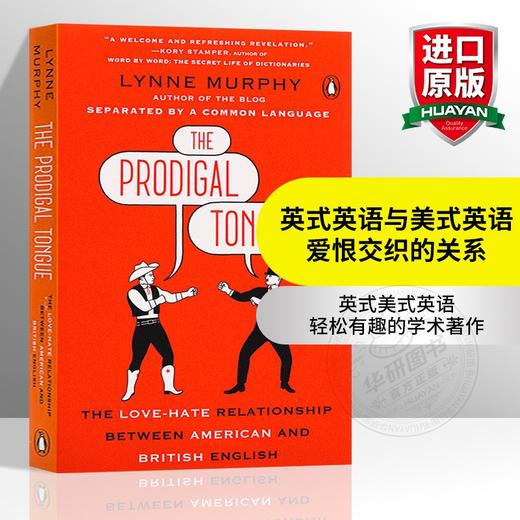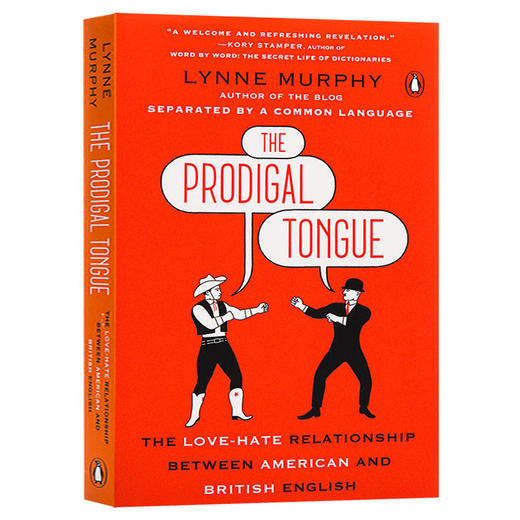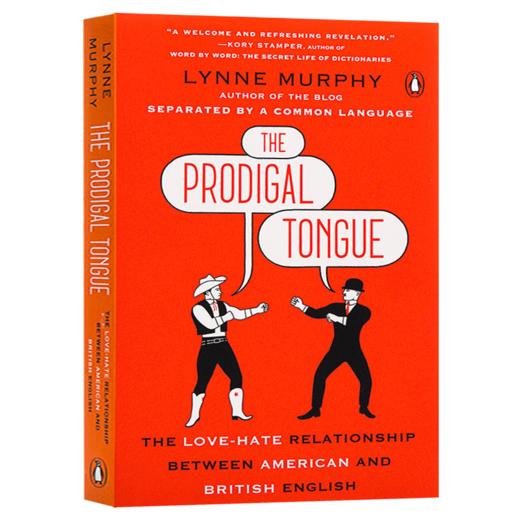英式英语与美式英语爱恨交织的关系 英文原版 The Prodigal Tongue 英语和美语 琳恩墨菲 Lynne Murphy 英文版进原版英语书籍
| 运费: | ¥ 0.00-999.00 |
| 库存: | 8 件 |
商品详情
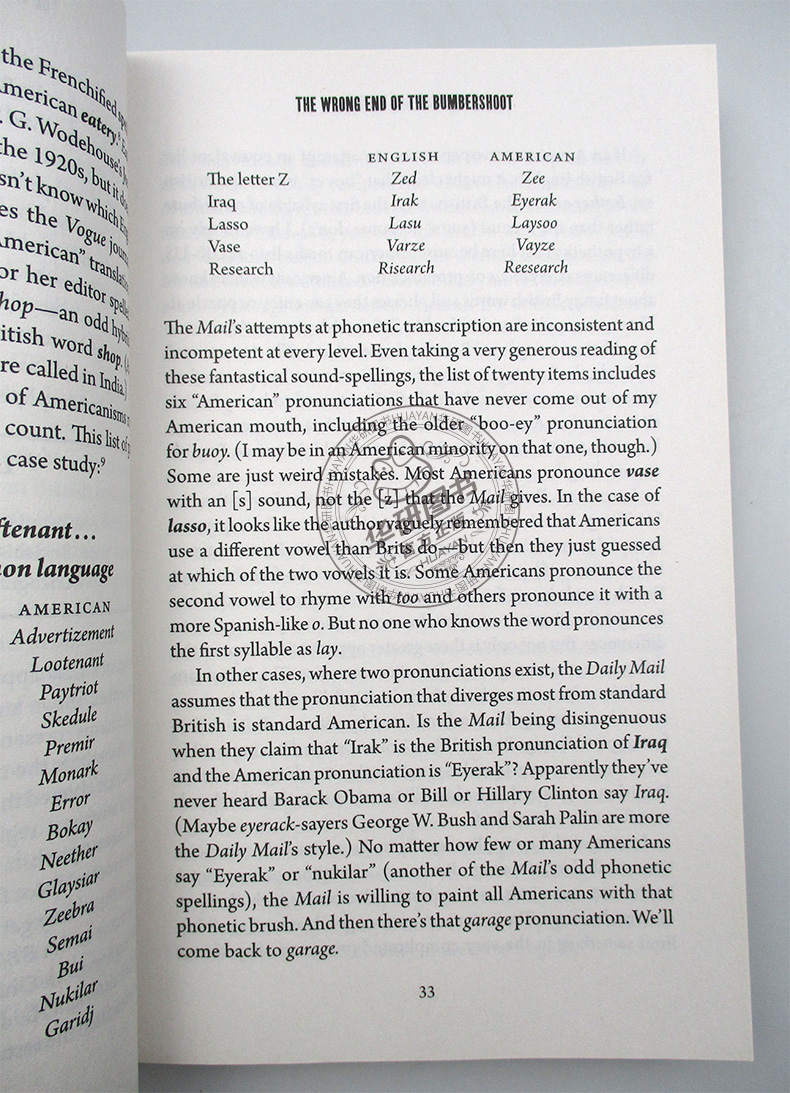
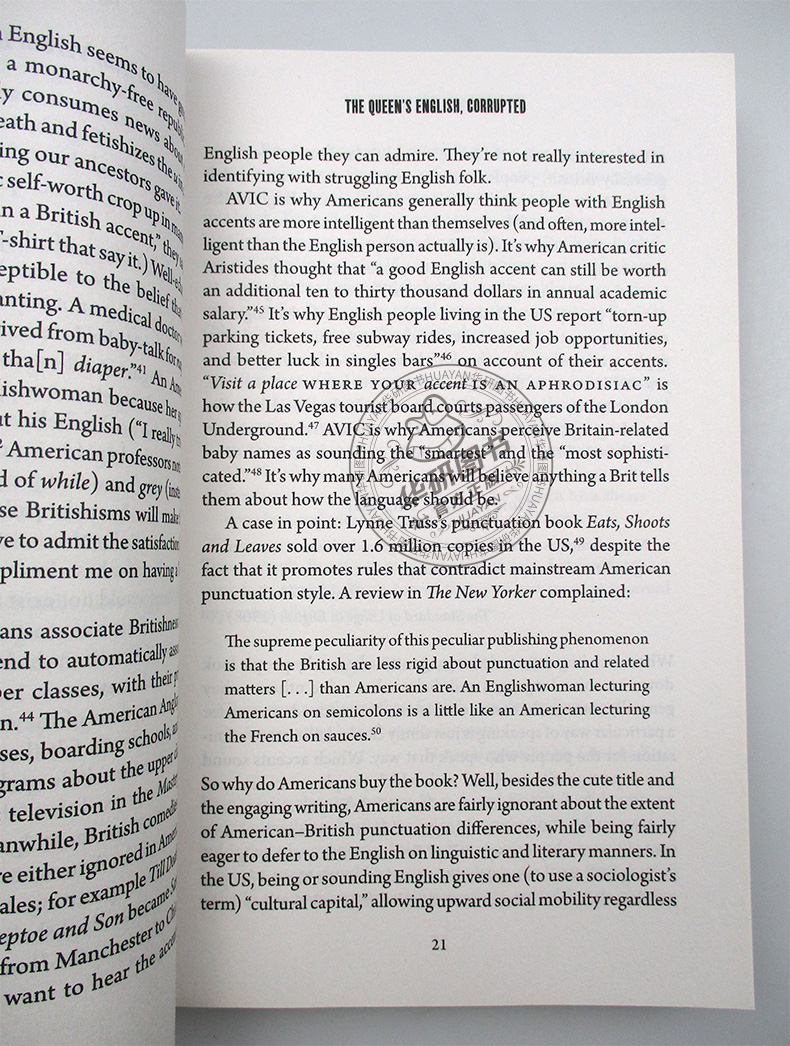
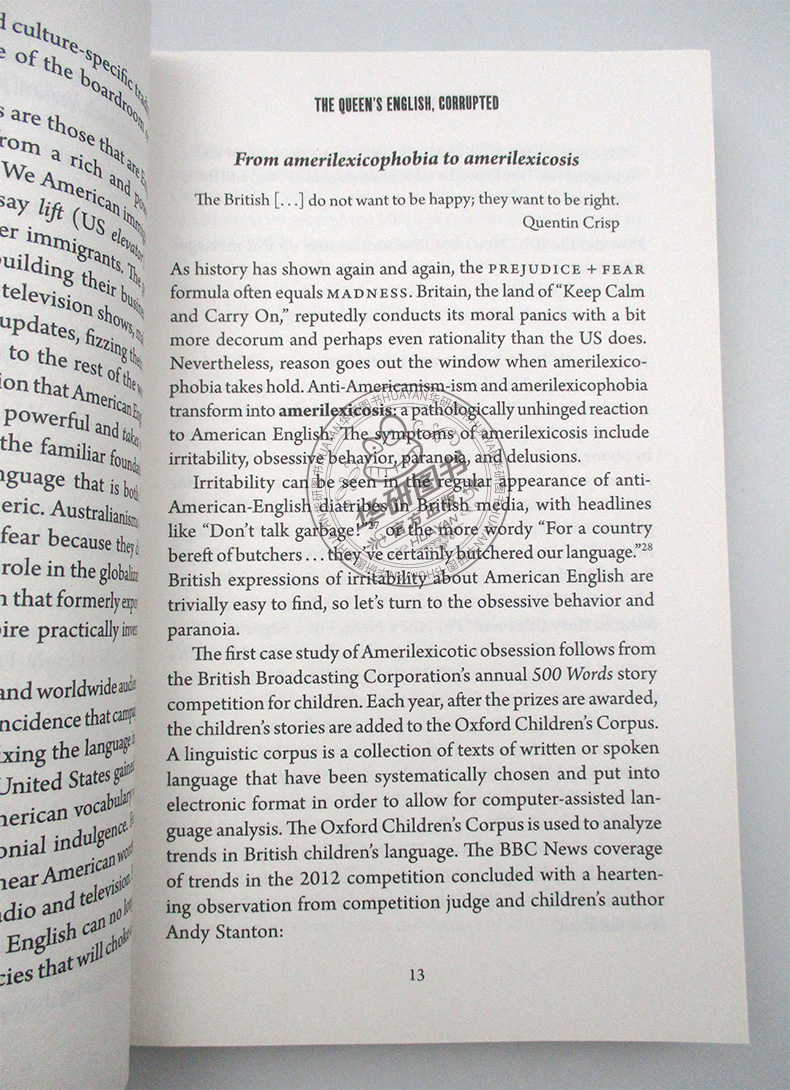
 书名:The Prodigal Tongue: The Love-Hate Relationship Between American and British English英式英语与美式英语爱恨交织的关系
书名:The Prodigal Tongue: The Love-Hate Relationship Between American and British English英式英语与美式英语爱恨交织的关系
作者:Lynne Murphy
出版社名称:Penguin Books
出版时间:2018
语种:英文
ISBN:9780143131106
商品尺寸:13.9 x 2 x 21.2 cm
包装:平装
页数:368(以实物为准)
 琳恩·墨菲是一位在英国教书的美国语言学家,她在课堂上常常听到学生们对于“英式英语和美式英语哪种更好”不休的争论。
琳恩·墨菲是一位在英国教书的美国语言学家,她在课堂上常常听到学生们对于“英式英语和美式英语哪种更好”不休的争论。
为此,她站在语言学的角度,针对美式英语与英式英语相对而言的优点,著成了The Prodigal Tongue: The Love-Hate Relationship Between American and British English《英式英语与美式英语爱恨交织的关系》一书。这是第1本由事实和分析,而不是民族主义偏见占主导的书。作者在书中研究了美国语言自卑情结的成因和症状,揭示了人们对语言的偏见、刻板印象和不安全感。虽然是学术性著作,读来却轻松有趣! An American linguist teaching in England explores the sibling rivalry between British and American English “English accents are the sexiest.” “Americans have ruined the English language.” Such claims about the English language are often repeated but rarely examined. Professor Lynne Murphy is on the linguistic front line. In The Prodigal Tongue she explores the fiction and reality of the special relationship between British and American English. By examining the causes and symptoms of American Verbal Inferiority Complex and its flipside, British Verbal Superiority Complex, Murphy unravels the prejudices, stereotypes and insecurities that shape our attitudes to our own language. With great humo(u)r and new insights, Lynne Murphy looks at the social, political and linguistic forces that have driven American and British English in different directions: how Americans got from centre to center, why British accents are growing away from American ones, and what different things we mean when we say estate, frown, or middle class. Is anyone winning this war of the words? Will Yanks and Brits ever really understand each other? Review"The book’s chief pleasure is a simple one: Instead of sending the language to school, it savors a great many words and phrases that are staples on one side of the pond and unfamiliar on the other...her essential argument is that the plurality of English, a result of the riotous drama of history, is something to extol." —Wall Street Journal "Thoughtful, funny, and approachable... The book’s momentum comes from Murphy’s witty presentation, but its real power comes from its commitment to inquiry and its profound belief that 'communication involves a million little acts of faith.'" —Publishers Weekly "[Lynne Murphy] has a delightfully sardonic style... A passionate defense (or is it defence?) of the 'fantastically flexible medium' that is English." —Kirkus Reviews "[Murphy’s] delivery is sparkling, her approach mischievous, her material brightened by the unexpected… a potpourri of enchanting, counterintuitive surprises…The Prodigal Tongue is playful, funny, smart and often humbling… before the apocalypse, you could do worse than read Lynne Murphy’s delightful book." —Times Literary Supplement
 Lynne Murphyis Professor of Linguistics at the University of Sussex. Born and raised in New York State, she studied Linguistics at the Universities of Massachusetts and Illinois, before starting her academic career in South Africa and Texas. Since 2000, she has lived in Brighton, England, where she has acquired an English husband, an English daughter, and an alter ego: Lynneguist, author of the award-winning blog Separated by a Common Language.
Lynne Murphyis Professor of Linguistics at the University of Sussex. Born and raised in New York State, she studied Linguistics at the Universities of Massachusetts and Illinois, before starting her academic career in South Africa and Texas. Since 2000, she has lived in Brighton, England, where she has acquired an English husband, an English daughter, and an alter ego: Lynneguist, author of the award-winning blog Separated by a Common Language.
 Americans are ruining the English language. I know this because people go out of their way to tell me so. I am a magnet for such comments-an American who dares to teach English Language and Linguistics at a British university and who has the chutzpah to write about American and British language differences on the internet. But you don't need me to tell you about the wrecking ball that is American English-the talking heads of Britain have been pointing it out for years. English is under attack from American words that are "mindless" (the Mail on Sunday), "ugly and pointless" (BBC Magazine), "infectious, destructive and virulent" (the Daily Mail). American words "infect, invade, and pollute" (The Times). Even Prince Charles has assessed the situation, warning that American English is "very corrupting."
Americans are ruining the English language. I know this because people go out of their way to tell me so. I am a magnet for such comments-an American who dares to teach English Language and Linguistics at a British university and who has the chutzpah to write about American and British language differences on the internet. But you don't need me to tell you about the wrecking ball that is American English-the talking heads of Britain have been pointing it out for years. English is under attack from American words that are "mindless" (the Mail on Sunday), "ugly and pointless" (BBC Magazine), "infectious, destructive and virulent" (the Daily Mail). American words "infect, invade, and pollute" (The Times). Even Prince Charles has assessed the situation, warning that American English is "very corrupting."
Perhaps you had thought someone or something else was causing English's demise. Maybe it's inarticulate young people, bent on creating a future English that consists of little more than strings of so like kinda this and stuff. Or is technology responsible? BBC journalist John Humphrys likens text-messagers to Genghis Khan; they are vandals who are "pillaging our punctuation; savaging our sentences; raping our vocabulary." Business jargon is another likely suspect. Don Watson, in his book Gobbledygook, argues that management-speak expressions "sterilise the language and kill imagination and clarity." In fact, the plain-language promoters at Clarity International blame business jargon for the financial crisis of 2008-the language of banking had become so meaningless that customers could not understand the risks they were signing up for. But look closer and you may decide that all these dangers to English are just symptoms of a linguistic malady whose ground zero is the United States. For instance, if young people are ruining the Queen's English, should we blame them, or blame America? The United States invented 20th-century childhood, which continues to shape culture worldwide in the 21st century. The seen-but-not-heard Victorian girls and boys of Britain have been replaced by the American inventions of the teenager and the tween. Children born in Essex or Edinburgh or Aberystwyth live part of their lives in a virtual America, home of hip-hop, Disney princesses, caped superheroes, and fast food. The situation is bad enough that in 2007 the British media regulator Ofcom (the equivalent of the US Federal Communications Commission) called for a national debate on the proliferation of American children's television on British screens. "We don't want our children growing up with American accents," proclaimed former BBC Play School presenter Baroness Floella Benjamin. It may be too late. British young people, like their American counterparts are, like, ending their statements as if they were, like, questions? And the youthful English speakers are not all that young anymore. As Oscar Wilde observed: "The youth of America is their oldest tradition. It has been going on now for three hundred years." More than a hundred years after Wilde's quip, the lines between childhood and adulthood have become blurred by adults' refusal to put away childish things, with the US leading the way. The American invention of the word kidult underscores the point. In kidulthood, grown-up speech becomes more casual: no one wants to be called Mister or ma'am. We feel free to mumble our gonnas and lemmes. And everything is awesome.
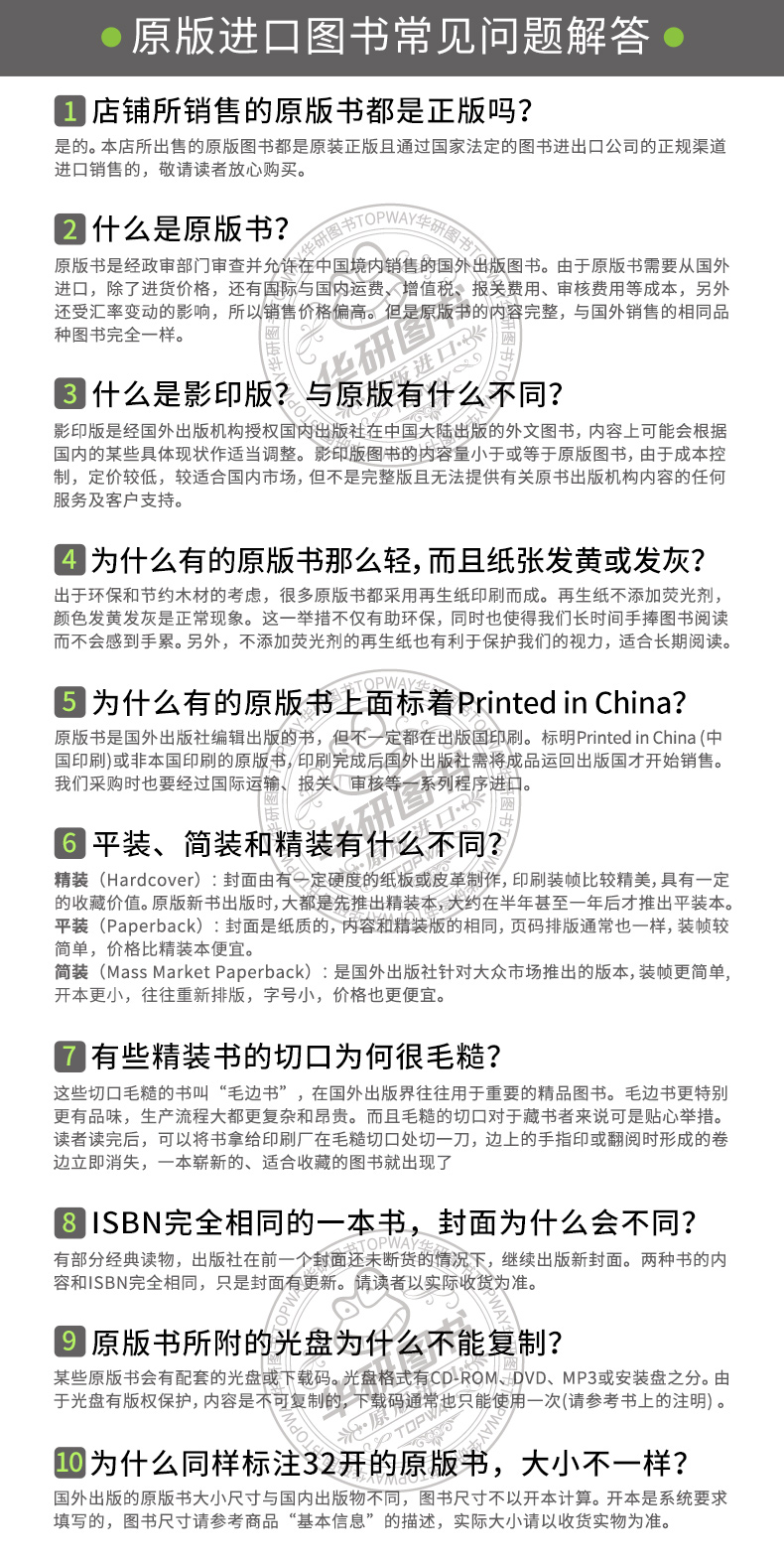
- 华研外语 (微信公众号认证)
- 本店是“华研外语”品牌商自营店,全国所有“华研外语”、“华研教育”品牌图书都是我司出版发行的,本店为华研官方源头出货,所有图书均为正规正版,拥有实惠与正版的保障!!!
- 扫描二维码,访问我们的微信店铺
- 随时随地的购物、客服咨询、查询订单和物流...
